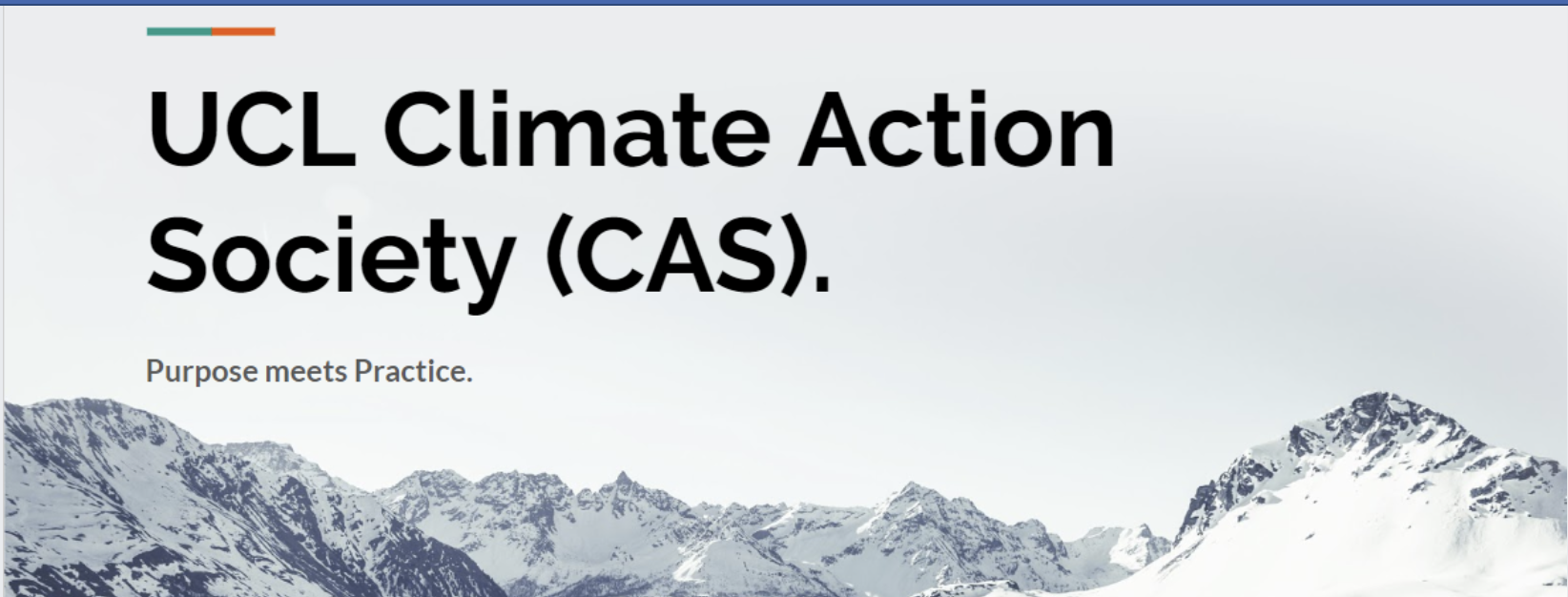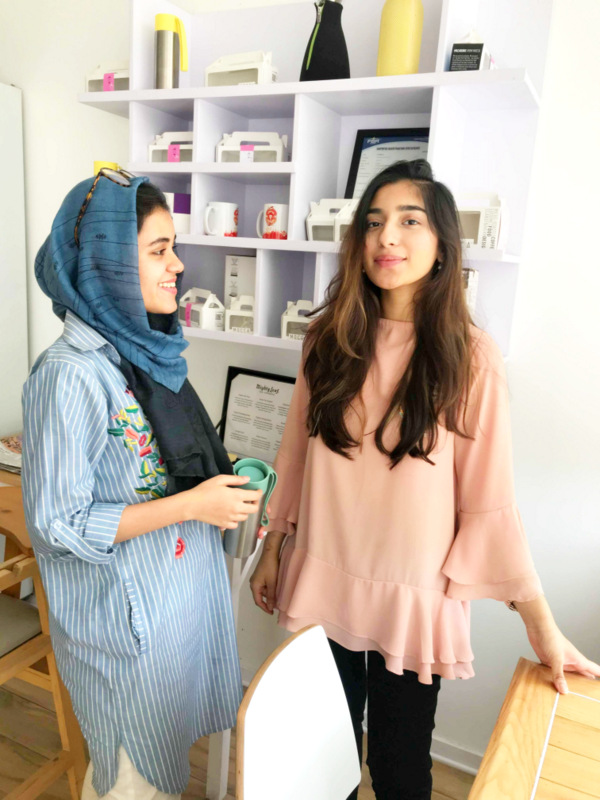NICK FERRIS interviews Aliza Ayaz, founder and president of UCL Climate Action Society, in anticipation of the society’s flagship event, The Sustainability Symposium, taking place on 16th November.
It is September 2017. Students are returning to UCL, ready for a year of twelve-hour stints in the library, lectures in the Royal National Hotel and striking academics. Swarms of bright-eyed freshers flood the Bloomsbury Campus, hopelessly searching for Medawar and Rockefeller Buildings as they struggle to make it to 12pms following the previous night’s Freshers’ Week antics. Come the Freshers’ Fair, thousands eagerly sign up to everything from Chocolate society to Ultimate Frisbee, Muay Thai to UCL Marxists.
Amongst this new cohort of undergraduates was one Aliza Ayaz, a half-Lebanese, half-Pakistani permanent resident of Dubai studying the tiny specialised course of Population Health. She was among the attendees the Freshers’ Fair, but unlike most, she left feeling uninspired. For Aliza was thinking bigger. Much bigger. She wanted to make her mark amidst the plethora of societies that already existed – and at the same time, try and do so in a way that would encompass her great passion, which had developed while a schoolgirl studying Environmental Geography in Karachi: namely, the fight against global warming.
In the Spring of 2018 she came up with her solution: Climate Action Society (CAS), a new society whose aim is to try and introduce conversation on global warming in all aspects of life at UCL. Her idea proved so popular that its development was fast-tracked by the students’ union, allowing it to be fully established and ready by the autumn term of 2018, in order for Aliza’s flagship event, the Sustainability Symposium, to take place on November 16th. Featuring high-profile speakers from across the world of politics, arts and business, and with support from the UN as well as coverage by the BBC, CAS hopes that the Symposium will provoke greater conversation about global warming on campus in the months that follow.

To meet Aliza, as I did one crisp autumn morning in Dillon’s Cafe on Gower Street, is to be instantly taken by her personability. She is warm, funny and talkative – and she can talk and talk and talk. Simple questions receive a torrent in response – but not in a way that is ever off-topic or incoherent. She talks to express her passion for her society and the movement that her society is championing. When I ask her what it is that makes her society so special, she is quick to rattle off all the things CAS is doing that she thinks are so brilliant. ‘We have a blog, with an average of seven entrants from the public each week’ she says. ‘We hold all our events like workshops, talks, screenings and socials. I was speaking to my friend who does chemical engineering – she was talking about these CO2 capturers that can be attached to the house – we want to think about all of these kinds of things and promote them’.
Not yet convinced that an approach that features ‘screenings and socials’ is necessarily addressing the cliff-edge scenario of global warming, I question the word ‘action’ in CAS’s name, highlighting how it might be deemed problematic given the society’s apparent lack of intention to engage in direct action. ‘Action is happening through blog posts, workshops, discussions’ she is quick to respond. ‘That is happening as of now – and we do plan to do more, to go big. But we need the right base to stand on’. So it is certainly not a radical approach that she is taking up. ‘I don’t call anything a radical approach’, she rebuts. ‘I very much think all approaches are right; we are just doing something different: our aim is to explain the whole situation and give people the opportunity to comprehend, leaving them in the position to decide for themselves how they want to help’.
To Aliza, CAS’s unique selling point is its discursive and educative approach, which is used to appeal to the mass-market. She suggests that we cannot expect everyone to engage in strident lifestyle changes all at once, as that is unrealistic. ‘You’ve got to have cars, you’ve got to have your lifestyles, you’ve got to do all you’ve ever done’ she says. ‘We understand CO2 absorbers are expensive – we appreciate all of this, and we don’t want to attack anyone.’ Instead, she re-iterates that ‘the crux is to improve education and awareness’.
Yet something still doesn’t feel quite right here. Aliza seems to be suggesting that we can, to some extent, live as we always have done in spite of continued dire warnings from the scientific community, a recent UN report saying the world can only be saved through radical action over the next twelve years, and the fact that global carbon emissions are still rising in spite of all the action nations have already taken. The world is at a crisis point – how can we still be thinking about creating ‘climate action’ bodies that do not necessarily advocate a more forceful approach?
Aliza does not disagree with anything I say and nods vigorously at the notion of a global crisis. ‘The thing you have to understand’ she replies, ‘is that forceful rhetoric and calls to action is what has already characterised the narrative on climate change. And where have we seen the big changes? They just haven’t happened. We are speaking as educated and aware students in the metropolitan bubble of London – perhaps forceful rhetoric speaks to us. But to most people, so far it hasn’t worked’.
Given Aliza’s background living and studying across Europe and Asia, she suggests that the ‘kaleidoscope of influences’ that make up her outlook mean she is ‘ lucky to see the entire situation’ of how to approach global warming from the perspective of individual lives. Volunteering with UN Development around Karachi, Aliza tells me that she ‘saw how farmers are dying due to respiratory problems, heat and drought, that is all caused indirectly or directly from the trucks they drive around in’. But, she says, ‘we cannot simply tell them to stop driving. In the same way we have global expectations for the whole world to develop and be sustainable – as it stands, this is a contradiction, just expecting people to solve both issues. We need to understand why countries are keen on exploiting untapped fossil fuels, instead of just telling them that she should not take them out – and in the long term strive for them to be educated enough to make their own decision why climate change is so crucial’. This makes sense. In the same way that America has historically failed to impose democracy on its own terms in several countries in the Middle East – just so the West can’t impose stringent ideas on tackling global warming on less economically developed countries when they are understandably preoccupied with short-term aims of improving quality of life. Instead, people need to be educated in the climate movement, to allow them to realise for themselves the importance of the issue and the fact that ultimately its severity makes it as crucial factor as any in determining future quality of life.
CAS’s mass-market approach is also by no means intended to usurp the actions of other environmental societies at UCL, which do sometimes take a more forceful approach. Aliza is insistent that she has ‘so much credit’ for those that have come before CAS, telling me ‘We are building on what has come before and we are fostering new groups and creating new relevancies. I have so much gratitude to previous movements. They paved the way’. CAS, she says, is ‘about fostering the growth of those radical approaches by providing this network where everyone is educated enough to start with before making their own decision about how they want to act’. CAS is, in that sense, a mass-market stepping stone to more specific anti-climate change movements.
Aliza is particularly grateful to the work of Fossil Free UCL over the past few years in the kinds of direct pressure they have put on UCL management to divest: ‘We owe so much to them – if they hadn’t done what they were doing, CAS wouldn’t make sense and wouldn’t have any real platform’. The ‘real platform’ to which Aliza refers is the special link CAS has gained with UCL management; it is partly due to a letter of support from the UCL provost, Michael Arthur, that the creation of her society was fast-tracked. A skeptic, of course, would say that the provost is simply taking advantage of a more controllable student platform to pay lip service to the cause of fighting global warming, without making any kind of tangible action such as the divestment that Fossil Free UCL has long called on UCL to make, but which has still not occurred.

Aliza is quick to point out that she is aware of this: ‘I can certainly see the hypocrisy here – and divestment is something I raised with the provost when I met him’. On a utilitarian level, there remain benefits of this connection even if the provost might have ulterior motives when partnering with CAS. ‘I have been able to sit down one on one and say ‘oh this needs to be done’ in a way nobody else had done before’ she tells me. ‘I am now in contact with policy makers at UCL who are explaining to me the new policies they have in place, that before students would just be completely unaware was happening. For the first time we can have real, productive conversation with UCL management’. She is keen as well to stress that she does not see this connection as ‘a privilege’, but instead seeks only to place herself as ‘a mediator’ – someone who can smooth the compromise between the aims of students and what UCL’s governing body claim to be the realities of governance.
After nearly an hour and a half’s conversation with Aliza, and admittedly despite some initial skepticism, I cannot help but be convinced by what she has to say. In essence, Aliza is calling for an approach to global warming that addresses the issue through education and conversation, taking into consideration differences in people’s backgrounds while still emphatically addressing what is undeniably the defining issue of our generation. Her ideology for CAS is to speak to everyone, from leaders to your average citizen, without closing any doors or isolating a particular group, in the hope one day even the most unconscientious individuals might be motivated to look at more specific issues such as the need to divest and re-invest in green initiatives, change our diets or lifestyles, and rethink our sustainability policies. One phrase that Aliza brought up time and again was ‘global lifestyle issue’. She wants to generate a discussion on global warming and the environment in all aspects of everyone’s lives. And while she might only be addressing the UCL bubble at the moment, it seems not an unlikely bet that she might soon have her eyes set on far larger arenas.
This content is published to coincide with UCL Climate Action Society’s flagship event, The Sustainability Symposium.
The Sustainability Symposium will take place on 16th November 2018.





